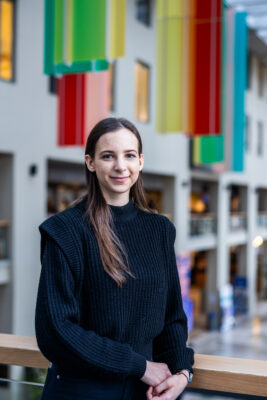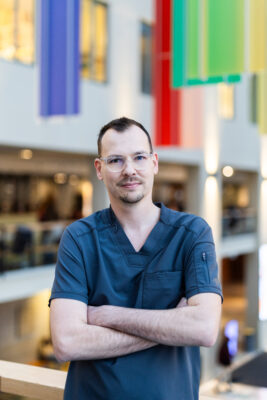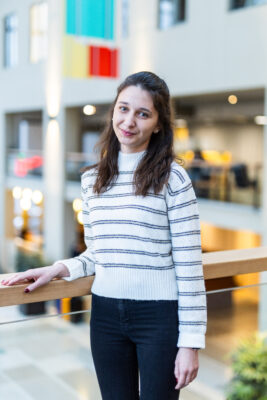 Attila Mócsai
Attila Mócsai
PhD, MD
Principal Investigator, professor
E-mail: mocsai.attila@semmelweis.hu
Our research group studies the molecular mechanisms of the development of inflammatory diseases and the function of various cell types of hematopoietic origin using state-of-the-art in vitro and in vivo molecular genetic approaches.
Dániel Csete
PhD, MD
assistant professor
E-mail: csete.daniel@semmelweis.hu
My research focuses on micro-CT imaging, which I utilize for the detailed investigation of osteoclast function and the pathomechanisms affecting bone metabolism.
Dorottya Deli
Medical engineer MSc
PhD student
E-mail: deli.dorottya@semmelweis.hu
My research focuses on the pathomechanism of inflammatory kidney diseases, particularly glomerulonephritis, and the signaling pathways of myeloid cells. Additionally, I investigate cell line-specific tyrosine kinase signaling pathways in a nephritis model, which may contribute to the development of targeted therapies.
Krisztina Futosi
PhD, biology MSc
assistant professor
E-mail: futosi.krisztina@semmelweis.hu
I focus on investigating the molecular pathomechanism of gouty arthritis, primarily examining the role of tyrosine kinase signaling pathways in urate crystal-induced phagocyte activation and in the in vivo experimental gout model, using transgenic and pharmacological approaches.
Daniella Görög
Medical engineer MSc
PhD student
E-mail: gorog.daniella@phd.semmelweis.hu
Márk Havasi
MD
PhD student, research fellow
E-mail: havasi.mark@semmelweis.hu
My research involves the generation of genetically engineered neutrophil progenitors using the HoxB8 system, and in vivo models to investigate the effects of gene modification on the functions of maturationally differentiated neutrophils.
Emiliána Jex
molecular biology MSc
PhD student, assistant lecturer
E-mail: jex.emiliana@semmelweis.hu
In my research, I investigate the functional properties of neutrophil-like cells (HoxB8 NLCs) derived from genetically modified, conditionally immortalized myeloid progenitor cells (so-called HoxB8 progenitors) in in vitro systems.
 Petra Koncz
Petra Koncz
MD
PhD student, assistant lecturer
E-mail: koncz.petra@semmelweis.hu
My research investigates the role of phospholipase-Cγ2 (PLCγ2), an enzyme in the immunoreceptor signalling pathway, and the effects of various JAK inhibitors in an animal model of an immune complex-mediated autoimmune blistering skin disease, epidermolysis bullosa acquisita.
Lukács Sándor Lesinszki
MD
assistant lecturer
E-mail: lesinszki.lukacs.sandor@semmelweis.hu
I investigate the pathogenesis of various kidney diseases, with a special focus on uncovering the role of innate immune cells and their signaling pathways in conditions that currently lack fully effective treatments.
 Dorottya Markó
Dorottya Markó
Medical engineer MSc
PhD student
E-mail: marko.dorottya@semmelweis.hu
The aim of my research is to investigate the intracellular tyrosine kinase signaling pathways in different leukocyte populations using flow cytometry techniques, in the presence of orally administered tyrosine kinase inhibitors in vivo and in vitro genetically modified HoxB8 cell lines.
Áron Pánczél
MD
assistant lecturer
E-mail: panczel.aron@semmelweis.hu
 Zsuzsanna Papp
Zsuzsanna Papp
biology MSc
PhD student, assistant lecturer
E-mail: papp.zsuzsanna@semmelweis.hu
My research investigates the role of leukocyte-specific cell surface proteins, ß2-integrins, in vivo in a serum-induced animal model of an autoimmune disease, rheumatoid arthritis. I also investigate the role of these proteins in vitro.
Edina Simon
research fellow
E-mail: simon.edina@semmelweis.hu
Nikolett Lilla Szénási
biology MSc
research fellow
E-mail: szenasi.nikolett@semmelweis.hu
Simon Vikár
MD
PhD student, assistant lecturer
E-mail: vikar.simon@semmelweis.hu
My research focusis on a rare autoimmune blistering skin disease, in close collaboration with clinicians to investigate the role of immune receptors and the complement system in the pathogenesis using a fully human model system.







